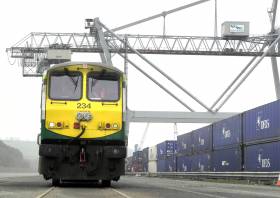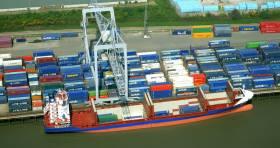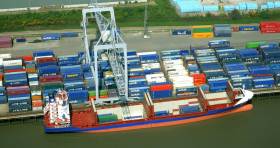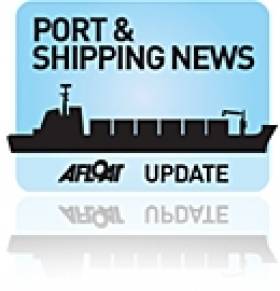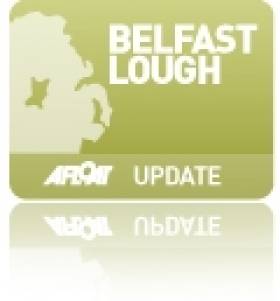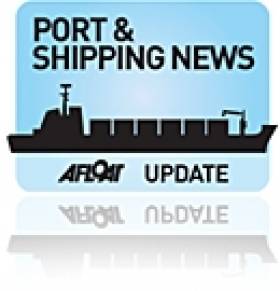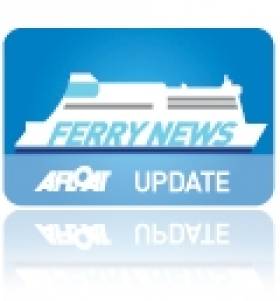Displaying items by tag: DFDS Logistics
Port of Waterford Rail-Freight Contract Ceases
#Ports&Shipping - Port Waterford has confirmed that the contract held by DFDS with Irish Rail to operate a freight train between Belview Port and Ballina, Co Mayo ceases tomorrow (today, 29 May).
As RTE News reports, the Port of Waterford Chief Executive Frank Ronan said they were sorry to see the end of the service.
"It was a nice addition to our portfolio and it was great to be able to provide a port service to stakeholders in the northwest region.
"As the volumes involved were relatively small and likely to be replaced, we do not expect that our throughput of containers will be negatively impacted.
"However, it is a shame to see something that can take trucks off the road and reduce carbon emissions ceasing rather than growing and prospering.
For more on the storey click here.
#Railfreight - It was another year of increases to rail freight traffic on Iarnród Éireann / Irish Rail (IÉ) during 2016 according to MultiModal, with the number of freight trains operated being up 6% and tonnes carried up by 8% on 2015.
In 2015, 96.4 million tonne kilometres of freight were moved by rail in Ireland and this increased by 5% to 101.5 million tonne kilometres in 2016. In that same year multimodal trains serving DFDS Logistics (shipping container operator) increased by 6%. The railway operation is run by Dublin based International Warehousing and Transport (IWT).
IWT commenced their rail operation on 19 August 2008 with just two return trains per week from Dublin Port to Ballina in County Mayo and now with up to seven return trains per week the 2000th train was operated for the company by IÉ on 16th August this year. Two return multimodal services per week are also operated for DFDS Logistics between Port of Waterford (see 2016 overall figures) and Ballina, with shipping connections to Europe via Rotterdam.
Multimodal traffic has been steadily increasing on IÉ now for several years with soft drinks and medical supplies for export being amongst the staple loadings. Rail routes from Dublin and Waterford ports are both cleared for conveying 9’6’’ hi-cube containers on standard platform wagons.
The number of bulk trains carrying pulpwood and zinc ore were also up by 6% on 2015. Pulpwood trains are operated for Coillte from Waterford and Ballina to Waterford where the timber is used for the manufacture of building products, most of which are exported. The ore trains operate twice daily from Navan to Dublin Port from where the product is exported.
During 2016 IÉ successfully completed the trail run of a 54 TEU multimodal freight train, the longest ever freight train run in Ireland.
Other initiatives during the year include ‘Rapid Rail’, a rail parcels service and also parcels collection lockers at principal stations on the network. The IÉ freight sector also operate ‘Navigator’, which specialises in the collection and distribution of automotive car parts. Navigator is amongst the best service of its kind in Europe with 99.6% of all deliveries arriving on time throughout the island of Ireland.
DFDS Group Raises Outlook after Strong Q2
#DFDSgroup - European shipping and logistics operator, DFDS Group, writes LloydsLoadingList.com has raised its outlook for 2016 after a strong performance in the second quarter in which its freight volumes were up 33%. The increase is thanks to its much-expanded English Channel ferry capacity and 9% growth in other parts of its network.
The expanded ferry capacity in the Channel business unit supported 63% higher freight volumes and 23% more passengers, while freight volumes were up by 9% in all other parts of the network. “The Logistics Division achieved strong earnings growth through higher volumes and efficiency in both trailer operations and contract logistics,” the Copenhagen-headquartered group said.
Revenue for the three months to 30 June increased by 7%, year on year, excluding revenue from bunker surcharges, while reported revenue increased by 4% to DKK 3.6 billion (US$548 million). EBITDA operating profits before special items increased by 27% to DKK 699m following higher earnings in both the Shipping and Logistics divisions.
As for the UK & Ireland, DFDS Logistics (container services including out of Belfast, Dublin, Cork and Port of Waterford) business, the number of transported units in Q2 increased by 43.2% compared to 2015 mainly driven by new contract logistics activities for cold stores in England.Since the commencement of the contract for one cold store in Q4 2015, a further two cold stores were added during Q1 2016.
Volumes were reduced by optimisation of traffic between N. Ireland and England and the Continent as well as lower temperature controlled and steel volumes in the UK. EBIT decreased by 9% to DKK 15m mainly due to the impact of lower temperature controlled and steel volumes as well as the loss of a logistics contract for a food manufacturer in 2015. The result was, moreover, negatively impacted by the depreciation of the British pound.
For much more about the DFDS Group's performance across the Benelux, North Sea and Baltic regions, click here.
#SeaRailFreight- A year has passed since Afloat.ie reported on the revival of container rail-freight services between Waterford Port and Ballina, to link in with DFDS Logistics sailing schedules to Europe.
According to multimodal.org.uk which has more on this, since the re-launch in early March last year of the DFDS Logistics liner trains between Ballina rail freight terminal and Belview Port at the Waterford of Port (onward shipping to Rotterdam) the service has moved over 2,500 containers.
The service, operating twice weekly in both directions, departure from Ballina at 11:05 on Tuesdays and Fridays and from Port of Waterford at 11:30 on Mondays and Thursdays.
DFDS to Shed 60 Jobs in Belfast Operation
#DFDSBelfast – Shipping and logistics company DFDS are to let go 60 jobs in Belfast at the end of this year as it shifts its finance centre to Poland.
Danish owned company DFDS said Belfast would be the first location to lose its finance department out of the 21 countries in which it operates.
The office on West Bank Road in Belfast will close in December, DFDS said. However its other Irish operations, including DFDS Logistics in Belfast and Dublin, are not affected.
For more on this story the Belfast Telegraph reports.
#SeaRailFreight- A new container rail-freight service between Waterford Port and Ballina began operating this week, to link in with DFDS Logistics sailing schedules to and from Europe.
The container trains are running to a twice weekly service in each direction linking the Belview Port terminal downriver of Waterford City and the northern Co. Mayo town.
According to Irish Rail (Iarnród Éireann), the new service will benefit customers in the west and north-west of Ireland in particular, providing them with a cost effective alternative when compared with a road based shipping. Coupled with this, the customer also reduces their carbon footprint.
The trains are scheduled to meet DFDS lo-lo vessels sailing from Belview Port to Rotterdam, which allows for onward delivery into Europe. Customers can now load in the west of Ireland on Tuesday morning and deliver in The Netherlands on Thursday pm/Friday am.
Rotterdam also provides access to DFDS sailings to Norway, and rail connections to Italy, allowing for a rail-sea-rail connection from Ballina to Milan.
DFDS will utilise a significant amount of available rail-wagons, but have left scope to develop the service further by introducing new customers, both internal Irish traffic and import / export traffic.
This is an important addition to the DFDS services in Ireland, and as a customer for Irish Rail's freight division. The new service is covering a longer distance, guaranteed volumes and direct port access.
The introduction of the service will see freight volumes increase from 91m tonne kilometres in 2012 to 105 m tonne kilometres approximately in 2013.
Seatruck Sailings Start on Dublin-Heysham Route
The vessel has accommodation for 12 drivers. Most of the daily sailings depart Dublin at 15:15hrs and return from the Lancashire port at 02:15hrs. On certain days the schedules vary, to view the timetable click here.
In addition to the new route for Seatruck Ferries, the freight-only operator has a fleet of 8 vessels on routes between Dublin-Liverpool, Warrenpoint-Heysham and Larne-Heysham.
Anglia Seaways arrived into Dublin yesterday morning from Avonmouth Docks, where the 120 unit capacity vessel went into temporary lay-up period, since departing the Irish capital on 31 January (see related posting and photo).
The 13,073grt vessel revived the 8-hour route yesterday with an afternoon sailing bound for Heysham. The vessel was originally reported to be relocated to Baltic Sea operations, but with its charter to Seatruck, the DFDS Seaways funnel symbol of the Maltese cross was painted out.
Though, the Maltese cross can still be seen in Irish ports with calls made by sisterships, Dana Gothia (ex. Maersk Westland) and Dana Hollandia (formerly Maersk Waterford) which are part of the DFDS Group container subsidiary DFDS Logistics.
In total the Lo-Lo shipping division operates four vessels on several routing options with weekly calls to Belfast, Dublin, Cork and Waterford to Rotterdam and Zeebrugge.
The German built sisters originally operated Dublin-Rotterdam and Waterford-Rotterdam routes for Norfolk Line (a subsidiary of Maersk / A.P. Moller Group).Incidentally Maersk /Norfolkline also owned the Anglia Seaways until DFDS Seaways purchased the vessel last year.


























